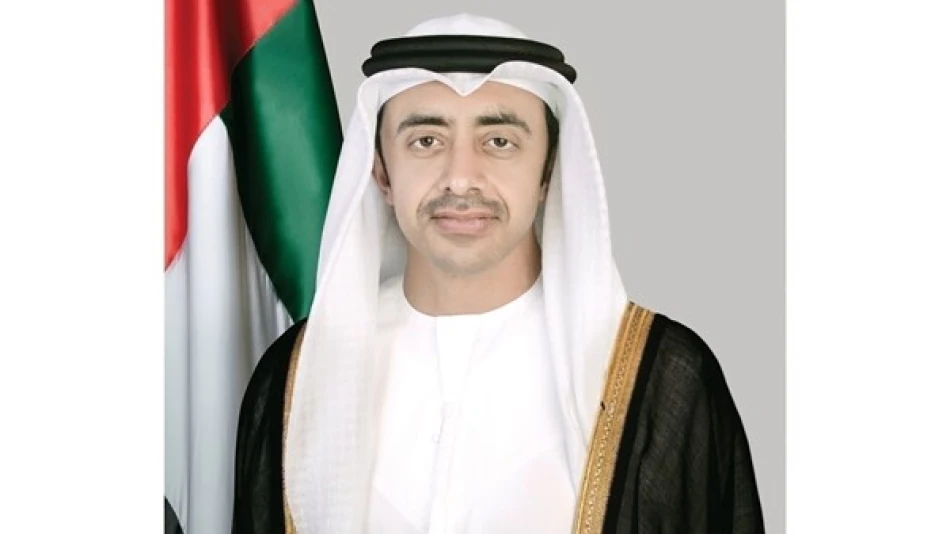
UAE's Foreign Minister Leads Delegation at UN General Assembly in New York
UAE Takes Center Stage at UN General Assembly With Reform-Focused Agenda
The UAE is positioning itself as a key player in reshaping global diplomacy as Sheikh Abdullah bin Zayed Al Nahyan leads the country's delegation to the 80th UN General Assembly in New York. Running from September 22-29, this year's session puts the Emirates squarely behind UN reform efforts while pushing its broader agenda of practical multilateralism over traditional diplomatic theater.
Beyond Diplomatic Pleasantries: A Strategic Push for Change
This isn't just another round of UN speeches. The UAE's participation reflects a calculated strategy to position itself as a bridge-builder in an increasingly fragmented world. Sheikh Abdullah's emphasis on making the UN "more flexible, efficient and effective" signals frustration with the organization's current limitations - a sentiment shared by many mid-power nations tired of Security Council gridlock.
The timing matters. With ongoing conflicts in Ukraine, Gaza, and elsewhere exposing the UN's structural weaknesses, countries like the UAE see an opportunity to push for meaningful institutional changes rather than cosmetic adjustments.
The UAE's Diplomatic Playbook
Climate Leadership as Soft Power
The delegation includes Dr. Sultan Al Jaber, the UAE's climate envoy who chaired COP28 in Dubai. His presence at the UN Climate Action Summit reinforces the UAE's strategy of using environmental leadership to build international influence. After hosting what many considered a successful COP28, the Emirates wants to maintain momentum on climate diplomacy.
Women's Empowerment and Modern Governance
The UAE is also highlighting women's roles in peace and security - a smart move that aligns with Western priorities while showcasing the country's social evolution. This approach helps counter criticism about human rights while demonstrating practical progress.
High-Stakes Meetings on the Agenda
The UAE delegation will participate in several critical discussions, including the Two-State Solution Conference and the launch of global dialogue on AI governance. These sessions reflect the country's attempt to be relevant across multiple issue areas - from traditional Middle East conflicts to cutting-edge technology governance.
The AI governance dialogue is particularly significant. As Gulf states invest heavily in artificial intelligence, the UAE wants a seat at the table when international rules get written. This proactive approach contrasts with countries that wait for regulations to be imposed on them.
What This Means for Regional Dynamics
The UAE's UN strategy fits into its broader regional repositioning. While Saudi Arabia focuses on mega-projects and economic transformation, the Emirates is building influence through diplomatic engagement and institutional leadership. This creates complementary rather than competing approaches within the Gulf Cooperation Council.
Ambassador Mohamed Abushahab's comments about multilateralism being "essential" rather than optional reflect a pragmatic view. Small and medium-sized countries need international institutions to have influence. The UAE recognizes this reality and acts accordingly.
The Broader Context
This UN session comes as the organization faces its biggest credibility crisis in decades. The Security Council's paralysis over major conflicts, combined with growing great power competition, has left many wondering whether the UN can remain relevant.
Countries like the UAE see opportunity in this crisis. By supporting practical reforms and offering concrete solutions, they can gain influence while larger powers remain deadlocked. It's a strategy that has worked for the Emirates in other international forums, from OPEC to various trade organizations.
The UAE's approach suggests a new model for middle power diplomacy - less about grand speeches and more about practical problem-solving. Whether this translates into real influence will depend on how effectively they can build coalitions around specific issues rather than abstract principles.
Most Viewed News

 Layla Al Mansoori
Layla Al Mansoori






